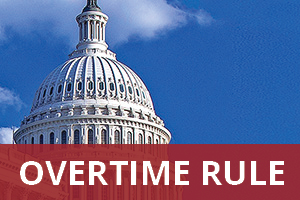by CUPA-HR | April 9, 2024
On April 4, CUPA-HR’s government relations team, President and CEO Andy Brantley, and four national board members met with officials at the Department of Labor (DOL) and the Office of Information and Regulatory Affairs (OIRA) to discuss the upcoming overtime regulations to increase the minimum salary threshold. During the call, the group expressed CUPA-HR’s broad concerns with the rule, as well as the specific challenges implementation of the new rule could create for different types of institutions in various areas of the country.
On March 1, DOL sent the final rule to update the Fair Labor Standards Act overtime regulations to OIRA for review. As previously noted, the OIRA review marks one of the last steps required before DOL can publish the final rule for public viewing. While the rule is at OIRA, the text and details of the final rule are not public, but interested stakeholders are able to request meetings with the administrator to discuss the proposed changes.
During the meeting, Andy Brantley and Bailey Graves from the CUPA-HR government relations team reiterated the concerns that were addressed in CUPA-HR’s comments submitted in November 2023. The comments made the following four recommendations for DOL to consider prior to issuing a final rule:
- DOL should not update the salary threshold at this time.
- DOL should lower the proposed minimum salary threshold and account for room and board.
- DOL should not implement automatic updates to the salary threshold.
- DOL should extend the effective date of any final rule implementing a higher salary threshold.
Brantley and Graves were joined by CUPA-HR Board Chair Jami Painter, Chair-Elect Robyn Salvo, and board members El pagnier Hudson and Kristi Yowell, who discussed the impact of these potential changes on employee exempt/nonexempt status and employee morale and benefits. They also discussed the impact of the rule on higher education’s efforts to offer competitive wages to employees, the difficulties of having employees in areas with different costs of living, and the impact this rule could have on an institution’s ability to provide student services.
Looking Forward
It is unknown when the final rule will clear OIRA review and be published for public viewing. OIRA review typically lasts 30-60 days, and OIRA meetings are currently set through April 11. However, the Biden administration has incentive to move quickly to publish the final rule in order to avoid the rule being overturned via legislation if Republicans win Congress and the White House in the November election.
The final rule will also likely face legal action once it is published, which could delay the effective date or stop the rule from going into effect in its entirety. CUPA-HR will keep members apprised of when the final rule clears OIRA review and is published, as well as any legal challenges that may arise.


